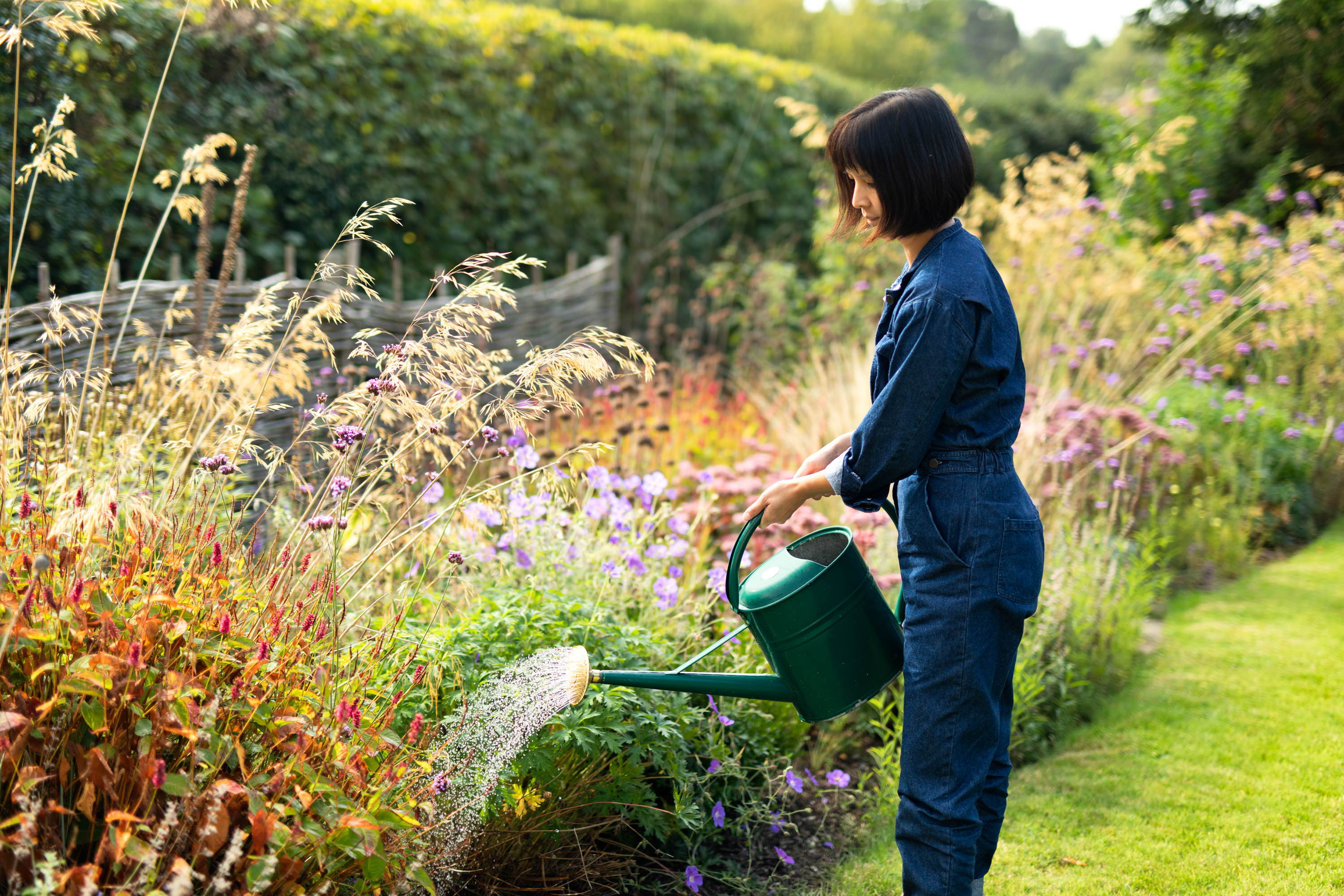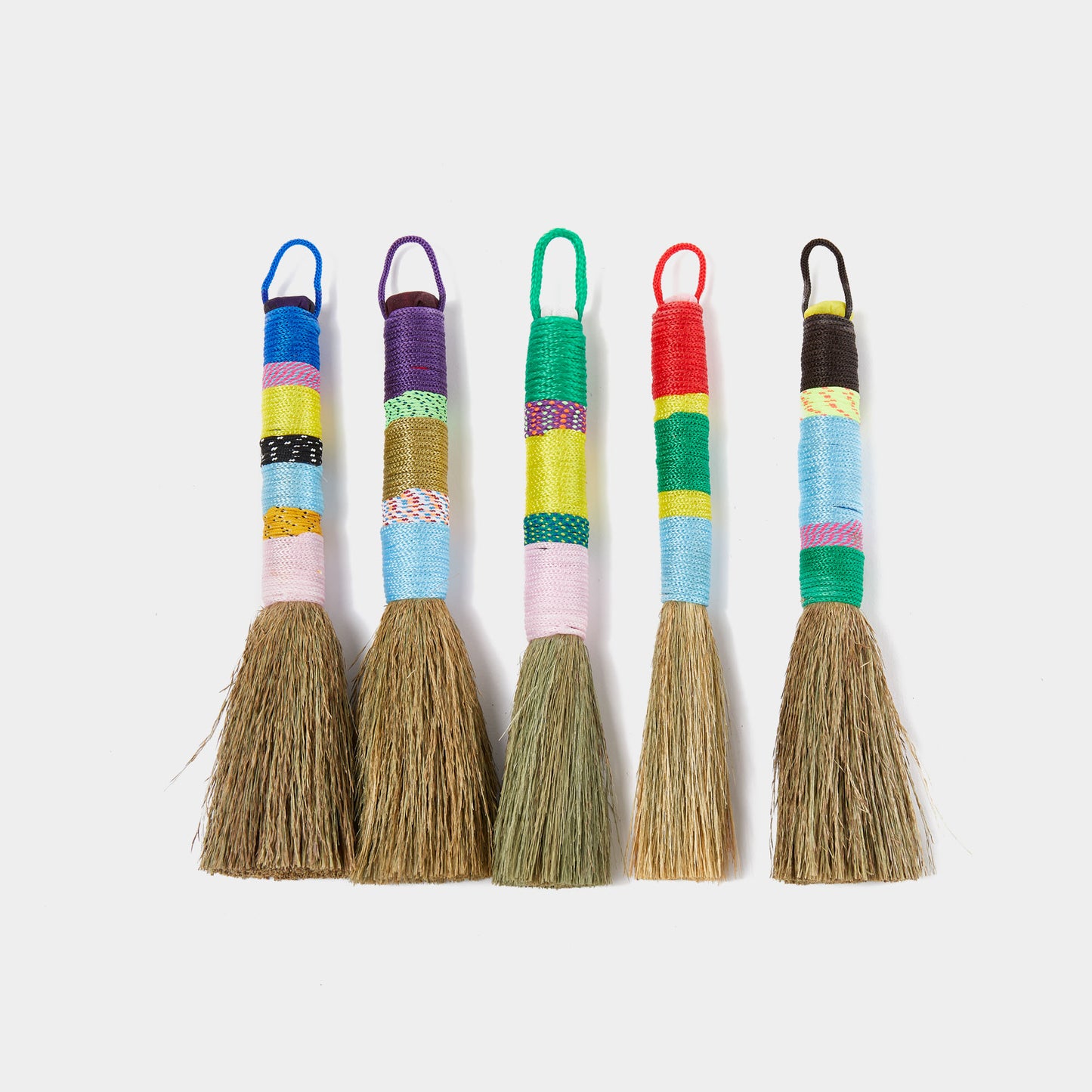
Sui, The Temperate Gardener
In Conversation
In her garden, nestled among the criss-cross of country lanes that define Southeast England’s countryside, Sui tends to her plants.
Sitting at the back of an old 18th-century landworker’s cottage, this garden holds stories among its leafy folds and is believed to have once been a cobnut plat (cobnut is a Kentish hazelnut and plat is an orchard). It is surrounded by mature trees and shrubs and has a lawn, colourful flower beds, meadow areas punctuated with wild orchids, knapweed, sorrel, birds foot trefoil and cowslips, and remnants of ancient woodland where bluebells grow in the spring under the oaks and cobnuts.

Sui is the woman behind @thetemperategardener and @decolonisethegarden. She’s a lover of plants, a career changer, a trained horticulturalist and a dabbler in printmaking. She stepped out of the corporate world to pursue a life more meaningful to her, which she found in gardening.
Yet, a love for the garden and connection to nature was instilled in her from a young age, from growing up in a rural village in the countryside and by her green-thumbed grandfather. An office job didn’t make sense for her. She belonged outside, among the plants. Not at a desk. These days, you’ll likely find Sui with her hands in the soil and working with plants in her ongoing collaboration with nature.
Sui exudes a softness that comes from respect for the living world and a gratitude for the beautiful green space she has access to – a privilege she graciously recognises. Sadly, access to outdoor space and land to tend is a privilege not afforded to everyone. As a WOC, Sui is now addressing the subjects of access, inclusivity and anti-racism, and particularly how they relate to the world of gardening and horticulture, on her digital channels.
“Gardening is all about having an intimate connection with nature and the joy that that brings. The pleasure, for me, is often in the small things and having the time, space and opportunity to notice them – the seasons turning, the wildlife, the light changing, growth, death, decay, regrowth.”


How did you get into gardening and horticulture?
I was working in an office, feeling hugely dissatisfied and knowing deeply that I didn’t want to be stuck at a desk in a corporate job forever. I knew I had to do something about it otherwise I was going to be miserable. I wanted a job that felt meaningful to me, something that was good for my soul, and I yearned for a connection to beauty, creativity and nature. I did a bit of garden volunteering and then went back to college to study Horticulture.



What is gardening for you?
In my mind, gardening is all about having an intimate connection with nature and the joy that that brings. The pleasure, for me, is often in the small things and having the time, space and opportunity to notice them – the seasons turning, the wildlife, the light changing, growth, death, decay, regrowth. I feel as though – especially in modern life – there is so much competitiveness, so much comparison, so many unwritten rules and there are so many sticks with which we use to beat ourselves. I’m resolute that the garden doesn’t become another stick for me. I see my garden as the antithesis of all that. It’s about finding joy in simplicity and appreciating the smaller things in life. It’s gardening to my own rules, at my own pace and to my own timelines. Finding beauty in what’s right in front of me and being present is what matters most to me. I make a conscious effort to keep it that way. It’s about remembering why I love it and why I want to be out there, and that’s for the connection to nature. It’s not about growing the most on-trend flowers or the showiest vegetables. I’m just not that interested in the competitive, domination side of it. Gardening to me is about being present, nurturing the earth and being a responsible human in the scheme of nature. Gardening is also about hope, of course. It is a fundamentally hopeful act. I also increasingly understand and see it as being a radical, subversive and political act of resistance too.


We couldn’t agree more. Could you tell us how you’ve learnt to recognise the small things and notice nature more?
I am fortunate that through working as a gardener, I have had moment after magical moment of appreciating the small things. And they were all as a result of simply being out there, spending time outdoors. Then it’s up to us to appreciate and marvel at them. For me, it would be seeing lapwings doing their mating dance above the fields in spring; or the early morning I drove to work down an avenue lined with amelanchiers in full flower and their blossom falling and swirling in drifts like snow – an incredibly beautiful sight that’s etched into my memory. The other day, a flock of long-tailed tits flew overhead from one side of the garden to the other, one after the other, in their bobbing, undulating flight. Last year, as I was preparing a bed to plant some linen flax for a local fibre project, I unearthed glow worm larvae. Or it may be as simple as sunlight slanting through the trees in a way that makes you stop and catches your breath. So many small, fleeting, magical moments. These days, people often talk about “having experiences" and "making memories” rather than buying material things. I’ve always thought that about gardening, being in nature and paying attention: having experiences and creating memories is what happens all the time as a matter of course. I have so many memorable moments from simply gardening and being outside, observing and appreciating.



Sui has created a garden that self-sows. But sometimes offers a helping hand.
Could you please talk about your approach to working with nature in the garden?
The way I see it, I’m sharing my garden space with nature. I’m just passing through. I’m a guardian of this patch of earth for as long as I live here. The garden will be here long after I have left. I have a responsibility to take care of it as best as I can. We as humans are a part of the nature around us. But we so often forget that and see ourselves as separate. We’re all part of the same system. The animals, insects and plants have as much of a right to this space as we do. We’re so used to dominating and controlling and seeing ourselves as superior to everything. I try to garden with wildlife in mind. I focus on insect-friendly plants so that there’s plenty to attract the bees, butterflies and other pollinating insects. I avoid pesticides. I try and keep mowing and watering to a minimum. I just try my best to tread as lightly, as gently and as responsibly as possible.



Over the years, you’ve created a dialogue with nature in the garden. Could you talk about this journey, from studying horticulture to your approach today?
I used to read all of the books and magazines and watch all the gardening programmes. I lapped it all up. I suppose when I first started gardening and studying, I was in a phase of soaking up lots of information, the science and the technical stuff. Once I’d built up knowledge, experience and a grounding in the science, I stopped consuming much of the media stuff. I realised it made me feel as though I “should” be doing this or that. It felt like pressure. Like competition. It can all get a bit much, just like the rest of life can with the dictates of society and all the rules and the ways we “should” be behaving. This isn’t to say that I’m not always learning and open to learning, and it isn’t to say that I’m averse to consuming beauty and inspiration every now and then. But rather than do all the things I “should” be doing in the garden, I do what feels right for me and when I have time and energy to do it. Mostly, I try to enjoy just being in the garden.
“The way I see it, I’m sharing my garden space with nature. I’m just passing through. I’m a guardian of this patch of earth for as long as I live here. The garden will be here long after I have left. I have a responsibility to take care of it as best as I can.”

In summer 2020, you set up an Instagram account called Decolonise The Garden. What are the motivations behind this?
Gardening, plants, nature, the outdoors, tending the land and nourishing our souls by doing so should be the domain of everyone – people of every colour should have a right to access them. But sadly, in our world today, this isn’t the case.
The point of the #decolonisethegarden, and the Instagram account that followed, is to raise awareness of and instigate action against racism and the insidiousness of supremacy within the world of horticulture. It came about in the wake of George Floyd’s murder, when BLM came to the fore and conversations about race, representation and diversity came top of the agenda and became mainstream. Sadly, racism is so deeply entrenched that some people believed that the lack of representation in the gardening world may be because POC aren’t interested in gardening. This is so preposterous!
The aim of the hashtag and account was to create a more inclusive space, push back against the toxic narratives within horticulture and gather the educational information that many people were contributing to the hashtag in one place, all in the hope that it would prompt gardening folk to interrogate their biases, question where their messaging comes from and be alert to how language, narratives and visual messaging can feed into inherent and systemic racism.



Could you talk about the legacy of colonialism in our gardens?
I think the most pernicious legacy of colonialism in the garden is the idea that white Western men “discovered" everything. This is what the history books tell us. But the plants brought back from faraway places existed long before the venerated plant hunters clapped eyes on them and smuggled them out of their native lands. They had long been foraged, admired, cultivated, eaten and used medicinally by Indigenous peoples. Yet these people and much of their Indigenous knowledge, history and stories are often ignored, forgotten, whitewashed or have gone unrecorded. Or arguably worse, Indigenous knowledge was appropriated, logged as new science, without reference to the true sources.
Botany and horticulture, like many modern sciences, have a tendency to be very white and Eurocentric and viewed through a colonial lens. This is how we’ve been taught and conditioned to see things. But we have the power to balance the narrative and be aware of the lens through which we view the world. This can be done through interrogating the language we use when telling plant and gardening history (or any history, for that matter) and questioning who is being centred and who is being erased or silenced by a narrative. It can be easy to glorify certain people and nations without addressing some of the problematic parts of a story. But who are we negating and making inferior by ignoring them in our storytelling, and what has been the cost to those left out of history?


How do you believe we can learn/unlearn and move forward positively, collectively and individually?
Telling honest and open stories of history and how plants and people got here is a start. Organisationally, there is a lot that businesses and institutions can do to demonstrate they are serious about being diverse, inclusive and that they truly care about tackling systemic racism and providing equal opportunities. But I think mostly, we have to concentrate and begin work on ourselves. I am not a race or anti-racism expert, but I believe we should all be educating ourselves to understand the history of race, racism and white supremacy as it exists today. There are lots of resources out there now as well as activists and educators who provide so much opportunity for learning. We should always be learning, questioning, self-interrogating and thinking critically. We should read the words of BIPOC, listen to what they are saying and believe what they are telling us. I feel that being aware and alert to our internalised, unconscious biases is important. It’s not always easy – some things are so deep-rooted, which is why being anti-racist is for the long haul.
We can also learn through our time spent outdoors. I think, when we garden with a greater level of awareness, it only adds to the richness and depth of our experience. We are all interconnected. I believe many gardeners have an innate appreciation of this anyway as we work closely with nature. Understanding that many of our garden plants and the food that we grow originate from all around the globe and that they carry stories and knowledge beyond the time they reached our shores just deepens our connection. All people and plants, this whole earth, are all intimately connected, and grasping this is incredibly humbling, grounding and enriching.
Thank you Sui for your thoughtful answers. You can follow Sui and her work on Instagram at @thetemperategardener and @decolonisethegarden.
Interview by Rachel Taylor | Images by Jody Daunton



